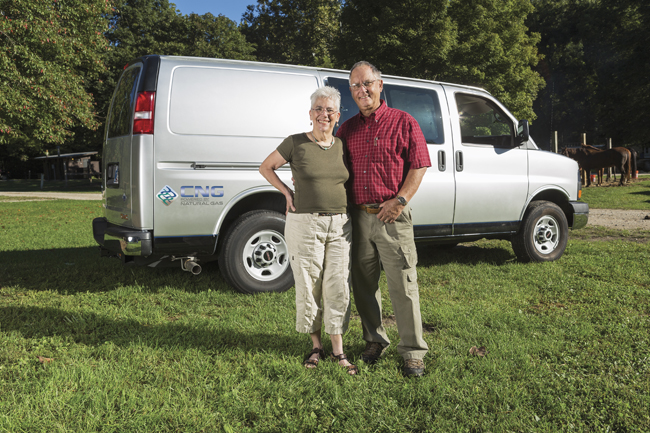BY JANET MANDELSTAM
It was the $2,000 tab for gasoline that caused Bob Appelman to seek a more economical way to enjoy the traveling-and-camping lifestyle that he and his wife, Becky, want to pursue now that they are retired.
The Appelmans’ small truck had pulled their light recreational vehicle (RV) to the Southwest and back, and when he calculated the cost of fuel, “I said this is not going to work; we’re too frugal.” A search for alternatives yielded what is still an unusual choice for a privately owned vehicle: a van powered by compressed natural gas (CNG).
“When I looked at the cost and the abundance of natural gas, I realized I could cut the price in half by using the cleanest-burning fuel there is,” Appelman says. According to the California Energy Commission, “Natural gas vehicles show an average reduction in ozone-forming emissions of 80 percent compared to gasoline vehicles.”
While many utility companies and municipal transit systems use CNG vehicles in their fleets, it was only two years ago that General Motors decided to offer cargo vans powered by natural gas. Appelman bought his at Curry Auto Center in Bloomington.
The van comes with three gas tanks under the floorboard, which allows for a trip of about 200 miles without refueling. But given the Appelmans’ chosen lifestyle and what could be a long distance between fueling stations—there currently are only 618 public stations in the U.S.—he added two more cylinders in the cargo area. “With the new cylinders we can go 450 miles now,” he says. With no local station available (the nearest is in Indianapolis), Appelman installed a compressor at home. “I’m the only station in Bloomington,” he jokes.
The van looks and operates like a typical gasoline-powered vehicle, he says. “It’s powered by a large V8 engine; there’s no difference in the ride or the sound; and at a refilling station, it takes about the same amount of time to fill.”
Because the cargo van has a bare-bones interior, Appelman is taking it to Prime-Time Specialty Vehicles in Elkhart to be customized. “We’ll have a raised top put on, wall panels, interior lighting, better seats, etc.” With a complete array of electrical hookups and even a camper’s toilet installed, the final cost will be about $75,000—slightly less than a comparably equipped, gasoline-powered RV—and the operating costs will be about half.
The Appelmans are planning a trip to Florida in December, driving just the van and leaving their 20-foot RV at home. Bob spent time plotting fueling stops. “We’re fine all the way to Georgia,” he says, “but there are only four stations [on their route] in the state of Florida.” He was contacting utility companies with private filling stations prior to the trip, and says “most will allow me to fill up.”
Appelman is optimistic about the future of CNG-powered vehicles. “I predict a thirty percent increase every year in the number of filling stations. And just think about what it could do for the environment.”
















So proud of my Uncle Bob and Aunt Becky! (And I’m not just saying that so they’ll take me on a trip with them someday….) :-) Way to go! Love, Lisa
WOW, THIS IS A WONDERFUL ARTICLE. SOUNDS LIKE LOTS OF RESEARCH, AND THEN A FINAL PRODUCT. THIS IS AMAZING! CONGRATS, BOB AND BECKY! YOU ARE ON THE CUTTING EDGE OF SAVING $$$ AND THE ENVIRONMENT! AND ITS CLASSY LOOKING, TOO. BY THE WAY, THE TWO OWNERS SEEMS FULL OF ENERGY, AND ADVENTURE!
LOOKING FORWARD TO HEARING ALL ABOUT THE TRIP TO FLORIDA!
LIZZIE